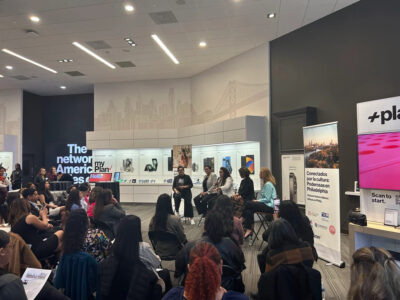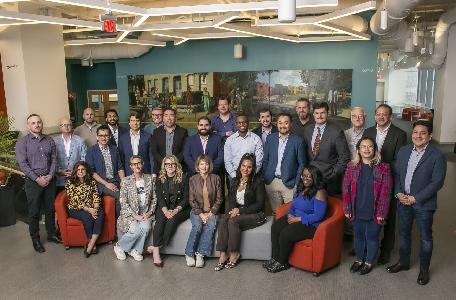It was Philly.rb, the local Ruby developer meetup, that made Trevor Lalish-Menagh love his job.
Lalish-Menagh, 37, still remembers the talk: Kevin Fitzpatrick, an engineer at Comcast Interactive Media at the time, was talking about a developer tool called Cucumber to a room full of “engaged, interested software developers.” The energy in the room struck him.
“Seeing the passion and energy of the Philly tech community made me want to become a better engineer,” he wrote in an email.
After seven years here, Lalish-Menagh, a principal software engineer at Comcast Interactive Media, is leaving the city for Seattle to be closer to his family.
In his exit interview, he talks about his proudest accomplishment at Comcast, his first job in Philly and why events like Rails Girls Philly are so important.
What brought you to Philadelphia? When? From where did you move?
We moved from a small town in Japan called Iinan in Shimane Prefecture where my wife and I had been teaching English for four years prior. In 2006, Michael Mangos came to teach in Iinan and we became good friends. He convinced me to move back to the US and become his first employee at Tamman Technologies. I had a great time working with Mike and his partner Jeff [Tamburino]. Back then, it was just the three of us in Jeff’s basement, now Tamman is thriving on N. 3rd St. I eventually left Tamman to work at Comcast Interactive Media in 2010.
What neighborhood did you live in?
I lived in West Mt. Airy, in the northwest section of Philadelphia. My wife and I fell in love with it when we stumbled upon a Mt. Airy Village Fair back in 2007 at the corner of Green and Carpenter Streets. We fell in love with the community and ended up buying a house a block away from that corner in 2009.
What will you be doing in Seattle? How did you decide to make the move?
I will be working for a small company called thePlatform. They create online video publishing and management solutions that are used all over the industry, including Comcast. Their biggest claim to fame recently was being the company behind streaming the Super Bowl for Fox Sports when the Seattle Seahawks won this year.
The decision for us was a hard one. In the last seven years, both my wife and I have fallen in love with Philadelphia. This is a city bursting at the seams with potential, a tech scene that rivals any city in the world and good down-to-earth people that want to do things right.
Ultimately, though, we had to choose family over city. All of my wife’s family and much of my own live in or around Seattle, and try as we might, we could not convince them to move to the East Coast.
Is there anything that could have been done to keep you here?
Bribe my family to uproot and move to Philly. 🙂
What was your proudest accomplishment during your time at Comcast?
There are so many things I was empowered to do at Comcast Interactive Media (CIM), it is hard to rank them all. The engineering team at CIM is second to none with managers that trust their employees and engineers that know how to follow through. I think, though, if I had to pick just one accomplishment at CIM that tops the rest it would have to be introducing a culture of testing to the front-end development team.
When I started, it was uncommon to write unit tests for JavaScript code, at CIM and the industry at-large. With the great help of my co-workers, I was able to develop a JavaScript test runner (EnvJasmine) that enabled our front-end developers to “break the build” for the first time ever. That led to more JavaScript unit tests, less customer-facing defects and a cleaner codebase.
How about your proudest accomplish in Philly in general?
There has been so much this tech community has given me, it is hard to choose. Helping to organize developer meetups Philly.rb and Philly Lambda has been a big part of my life here, as well as running academic paper reading circles like Functional Fall and A.I. Winter. Being a member of the PhillyETE (the annual Emerging Technologies for the Enterprise conference) committee for all these years has also been rewarding, but I have to say that my proudest accomplishment in Philly was being a part of the organizing committee for and teaching at Rails Girls Philly, a workshop to teach women Ruby on Rails.
I feel that it is a crucial mission for us in the software engineering field to raise up women that want to be engineers (even, and especially, if they do not know it yet). The Philly tech scene is making wonderful strides in this department with groups like TechGirlz and Girl Develop It. We need more groups like those to empower women to become great software engineers.
You’ve helped run Philly.rb since 2010. How has that meetup group changed over the years?
The biggest change I have seen in the group over the years is how much it has grown and reached out to other parts of the Philly tech community. With events like RedSnake Philly bringing the Philadelphia Ruby and Python communities together and our participation with Philly Tech Week, Philly.rb has truly blossomed in the past few years. We are seeing Ruby being used more and more in the industry as well, which (of course) helps bring developers into the fold as well.
It has taken the hard work and dedication of a number of individuals like Mat Schaffer, Jearvon Dharrie and Mike Ball and countless more to make Philly.rb the success it is today.
Can you share a lesson with us that you’ve learned during your time in Philly?
Certainly. Philly has taught me to be passionate about what I do. I remember the exact moment it hit me. I went to my very first Philly.rb meeting, my first user group meeting of any sort since college, in 2009. I was in a slump at work and was not too excited about being a software engineer at the time. Kevin Fitzpatrick was speaking about Cucumber to a room full of engaged, interested software engineers.
About halfway through the talk, I realized, “Here is a room full of people taking time out of their personal lives to learn something new. Here is a person speaking about their job with passion and excitement, and they loved their job.” I talked with some people afterwards, who also loved their job. Right then and there I said to myself, “I should love my job. It is awesome.”
I went in the next day at work and declared that we should all love our job, because it is awesome. My co-workers looked at me like I was nuts, but I really meant it. Seeing the passion and energy of the Philly tech community made me want to become a better engineer. I owe Philly a great debt of gratitude for that.
Any plans to return?
I hope that I can still be a part of the PhillyETE planning committee from afar, so with any luck, I will be able to return to Philly for ETE each year. (although my daughter, Eowyn Isabelle, was born on the second day of PhillyETE this year, so we might have to move the date. Birthday parties take priority. :P)
Philly has treated me well, and with the new Comcast building coming in a few years and City Hall’s dedication to technology and innovation, I think that the city will soon become one of the larger hub for technologists in the upcoming decade. I’ll be rooting for you with my Philly cap on from a ferry on the Puget Sound. Take care, Philadelphia, and know you will be missed.
Join the conversation!
Find news, events, jobs and people who share your interests on Technical.ly's open community Slack

Philly daily roundup: A better coffee supply chain; Philly Tech Week returns; Apply to Pennovation Accelerator

Philly daily roundup: Startups want office culture; New Venture Lab cohort; Penn Med's new AI leader

Will the life sciences dethrone software as the king of technology?
